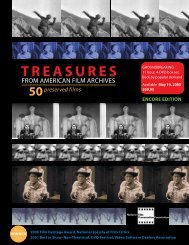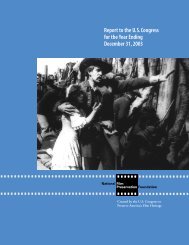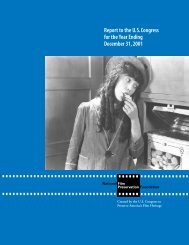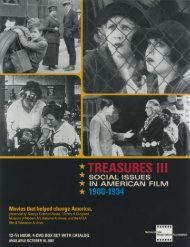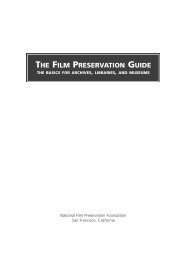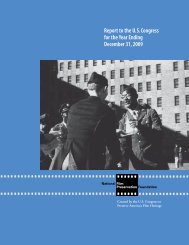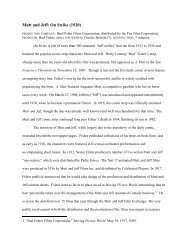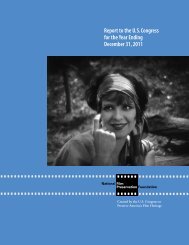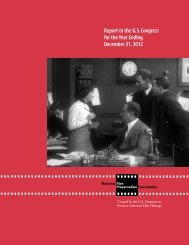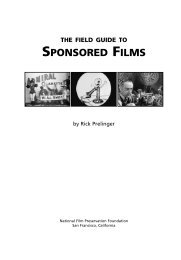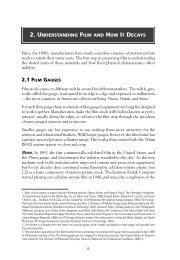view - National Film Preservation Foundation
view - National Film Preservation Foundation
view - National Film Preservation Foundation
Create successful ePaper yourself
Turn your PDF publications into a flip-book with our unique Google optimized e-Paper software.
2004 REPORT<br />
<strong>Preservation</strong> Grants<br />
Motion pictures have documented America<br />
for more than a century. <strong>Film</strong>s—by amateurs<br />
and professionals alike—have told stories,<br />
showcased communities, promoted social<br />
causes, shared aspirations, explained the work<br />
of business and industry, and illustrated the<br />
events of the day. Today these motion pictures<br />
are a window into vanished places,<br />
practices, and points of <strong>view</strong>. By saving this<br />
heritage we can experience, with the immediacy<br />
unique to film, how generations of<br />
Americans have lived, worked, and dreamed.<br />
Thanks to the preservation made possible<br />
through NFPF programs, 730 long-unseen<br />
works are now available to the public. Saved<br />
through our grants in 2004 were films of<br />
Johns Hopkins medical teams in World<br />
War II; natural history expeditions to Tibet,<br />
the Galapagos, and Angola; the motorcycle<br />
trek that blazed the Alcan Highway; peach<br />
cultivation in South Carolina; dairying in<br />
Appalachia; Pennsylvania forestry programs<br />
that inspired the creation of the Civilian<br />
Conservation Corps; the life of Puerto Rico’s<br />
first native-born governor; Joan Crawford at<br />
home; Navajo reservation life in the 1930s;<br />
Mardi Gras festivities of the Zulu Social Aid<br />
and Pleasure Club; and avant-garde works<br />
by Tony Conrad, George Kuchar, Gregory<br />
Markopolous, Meredith Monk, Allen Ross,<br />
Harry Smith, and Paul Sharits. The full list<br />
of preserved films is given in appendix 1.<br />
At the core of these efforts are the<br />
grants funded through The <strong>National</strong> <strong>Film</strong><br />
<strong>Preservation</strong> Act. These federal cash awards<br />
enable public and nonprofit organizations to<br />
make preservation masters and access copies<br />
of culturally and historically significant films<br />
that would be unlikely to survive without<br />
public support. Applying is a simple process.<br />
Nonprofit and public institutions submit<br />
brief proposals with written cost estimates.<br />
These are re<strong>view</strong>ed by an expert panel, which<br />
makes the awards. 1 All grant recipients share<br />
the new <strong>view</strong>ing copies with the public and<br />
store the new masters under conditions that<br />
<strong>Film</strong>s preserved through NFPF grants<br />
(from top): Malcolm X: Struggle for<br />
Freedom (1964, New York Public<br />
Library), Un amigo en Nueva York (1952,<br />
Hunter College, City University of New<br />
York), Evans Collection (1943, Japanese<br />
American <strong>National</strong> Museum).<br />
In Farm in a Day (1948), the Oklahoma City Chamber of Commerce, A&M College, the U.S. Soil Conservation<br />
Service, and hundreds of citizens join forces to transform 160 derelict acres into a working farm in 24<br />
hours. The Oklahoma Historical Society preserved this documentary from a 35mm nitrate print.<br />
1. The NFPF thanks those who<br />
served in 2004: Steve Anker (CalArts),<br />
Snowden Becker (Academy <strong>Film</strong><br />
Archive), Schawn Belston (Twentieth<br />
Century Fox), Margaret Bodde<br />
(The <strong>Film</strong> <strong>Foundation</strong>), John Carlson<br />
(Monaco <strong>Film</strong> Labs), Grover Crisp<br />
(Sony Pictures Entertainment),<br />
Mona Nagai (Pacific <strong>Film</strong> Archive),<br />
Rick Prelinger (<strong>National</strong> <strong>Film</strong><br />
<strong>Preservation</strong> Board), Del Reisman<br />
(Writers Guild of America, west;<br />
<strong>National</strong> <strong>Film</strong> <strong>Preservation</strong> Board),<br />
Rani Singh (Getty Research Institute/<br />
Harry Smith Archives), and Alan Stark<br />
(<strong>Film</strong> Technology, Inc.). Turner Entertainment<br />
Company and the Getty<br />
Research Institute graciously hosted<br />
panels.<br />
3



